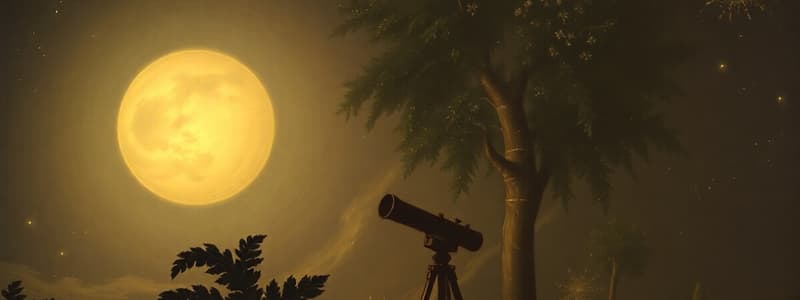Podcast
Questions and Answers
What was the primary motivation behind William Herschel's dedication to crafting powerful telescopes?
What was the primary motivation behind William Herschel's dedication to crafting powerful telescopes?
- To enhance terrestrial navigation by developing more accurate means of stellar positioning.
- To disprove existing astronomical theories by observing the night sky.
- To secure a prestigious position within the British monarchy by showcasing technological prowess.
- To observe beyond the known planets, venturing into uncharted regions of the cosmos. (correct)
What distinguished William Herschel's approach to astronomical observation from that of his contemporaries?
What distinguished William Herschel's approach to astronomical observation from that of his contemporaries?
- Employing complex mathematical models to predict celestial movements.
- Prioritizing spectroscopic analysis of nebulae to determine their chemical composition.
- Systematically mapping the night sky into sections while meticulously recording observations. (correct)
- Focusing exclusively on the study of binary star systems to determine stellar distances.
How did William Herschel's discovery of Uranus impact the field of astronomy?
How did William Herschel's discovery of Uranus impact the field of astronomy?
- Confirmed the existence of a planet beyond the classical limit of known planets. (correct)
- Challenged established theories regarding the formation of planetary systems.
- Revolutionized telescope manufacturing techniques on an industrial scale.
- Led to the development of new mathematical models for predicting planetary orbits.
What key findings resulted from Herschel's detailed astronomical observations beyond the discovery of Uranus?
What key findings resulted from Herschel's detailed astronomical observations beyond the discovery of Uranus?
What was the significance of Herschel's suggestion regarding the composition of nebulae?
What was the significance of Herschel's suggestion regarding the composition of nebulae?
What was the initial public perception of Herschel's large telescope, and what did Herschel believe about his observations?
What was the initial public perception of Herschel's large telescope, and what did Herschel believe about his observations?
What was the impact of Herschel's discovery of Uranus on the subsequent discovery of Neptune?
What was the impact of Herschel's discovery of Uranus on the subsequent discovery of Neptune?
Which of the following most accurately describes how Herschel's engineering skills influenced his astronomical pursuits?
Which of the following most accurately describes how Herschel's engineering skills influenced his astronomical pursuits?
In what way did William Herschel's work contribute to 19th-century astronomy?
In what way did William Herschel's work contribute to 19th-century astronomy?
What was the broader scientific impact of Herschel's identification of infrared rays?
What was the broader scientific impact of Herschel's identification of infrared rays?
Flashcards
William Herschel
William Herschel
A German-born astronomer known for his telescope innovations and discoveries.
Telescope
Telescope
An instrument used for observing distant objects by collecting and magnifying light.
Uranus
Uranus
The first planet discovered with a telescope by Herschel in 1781.
Infrared Rays
Infrared Rays
Signup and view all the flashcards
Cataloging Nebulae
Cataloging Nebulae
Signup and view all the flashcards
Double Stars
Double Stars
Signup and view all the flashcards
Moons of Uranus
Moons of Uranus
Signup and view all the flashcards
Moons of Saturn
Moons of Saturn
Signup and view all the flashcards
Systematic Observations
Systematic Observations
Signup and view all the flashcards
Impact on 19th Century Astronomy
Impact on 19th Century Astronomy
Signup and view all the flashcards



